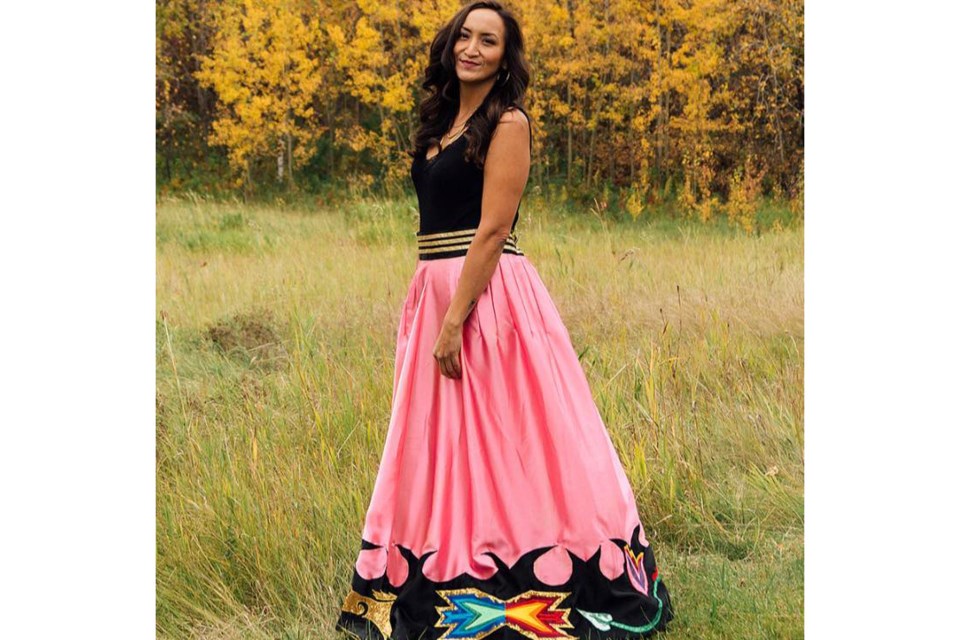LAKELAND - While she now finds herself working in Edmonton as the director of Indigenous Initiatives and kihêw waciston at MacEwan University, Terri Suntjens has strong ties to the area, and credits a number of people for guiding her in life.
"I have always recognized my parents Joe and Leona Cardinal from Saddle Lake Cree Nation, my family and friends, and the University nuhelot’įne thaiyots’į nistameyimâkanak Blue Quills (UnBQ) for their guidance in my journey. I wouldn't have been successful in my role at MacEwan if I wasn't grounded strongly in my identity as a nehiyaw iskwew. I owe that to our communities and those who continue to create spaces that are filled with love," says Suntjens, who is one of the most recent recipients of a prestigious Esquao Award.
The Esquao Award is handed out by the Institute for the Advancement of Aboriginal Women. The award ceremony is regarded as one of the most prestigious events in Alberta for recognizing and celebrating the accomplishments of Aboriginal women.
Suntjens is listed as a 2020 recipient, but due to the pandemic, the awards were delayed.
Regardless, Suntjens' work and dedication have not gone unnoticed. She says she was honoured to be gifted with the award, but she's not the first in her family to receive it.
"My older sister Clarice Anderson received this award two years ago and she has always been an inspiration for me. We have many of our Indigenous women in our surrounding communities who have received this award for their incredible work and I'm humbled to be recognized alongside these woman, who I have much respect for," says Suntjens.
Not only does Suntjens work for McEwan University, helping guide and support others, but she's also continually learning and pursuing her own education.
She recently completed a clinical MSW (Master of Social Work) with a specialization in trauma with the University of Calgary, and will begin her PhD in the fall.
And when the mom of two isn't busy with all that, she also co-hosts a podcast called '2 Crees in a Pod' with her friend Amber Dion, who is from Kehewin Cree Nation and teaches at MacEwan University in the School of Social Work.
When asked what guides her in the work she does, she refers back to a familiar local name in the community - Sherri Chisan, president of UnBQ. Suntjens says Chisan once shared that "some people inherit money, while we inherit responsibility."
Suntjens believes this to be true, and says that when she became a mother, she began to strive for change and movements that would create safer places for her kids, and works hard so "That my children will see themselves reflected in a positive light, because as Indigenous people we are often looked at from our experiences impacted by colonial violence, and we are much more then that." Simply put, she does what she does for her children.
Podcast
'2 Crees in a Pod' began shortly after the pandemic hit, when Dion approached Suntjens with the idea to create a podcast that honours, recognizes and amplifies Indigenous voices in social work education and beyond.
When Dion approached Suntjens with the idea, there was no hesitation.
"I don't think I have ever said no to Amber and vice versa. We have done a lot of work together over the past 10 years and this was nothing different. We are in our Season 4 and just celebrated our one-year anniversary. We have had many amazing folks on our podcast who have shared their stories, knowledge and songs with us," says Suntjens.
Residential Schools
A topic that cannot be ignored, Suntjens also shared her thoughts on the recently discovery of 215 children being found in unmarked graves in British Columbia.
"I have witnessed the grief across this country with our Indigenous communities over the past few days," said Suntjens, shortly after the announcement was made. "To all my relatives, know you are loved and while we are all processing this terrible news, healing is also happening. Through the vigils, the ceremonies, the sacred fires and the songs, healing is present."
Suntjens encouraged people to learn about Indigenous history, and the genocide Indigenous people faced in the country.
"It’s unacceptable if you are unaware of Indian Residential Schools. We can do better by taking some responsibility to educating ourselves," she says.
Suntjens' own father was #47 at Blue Quills Residential School. She recently asked her dad what he would like to see for future generations.
"He shared that he would like to see a change in our curriculums to ensure every student is taught about Indigenous history. He wasn't speaking to the cushioned teachings taught, but about the real truths that impacted our communities," explains Suntjens. "He added that he would love to see the Cree language taught in every school where Indigenous children go, from our grassroots language speakers."
But, if changes are to occur, education leaders need to step up.
"More mass graves will be discovered in the coming years across this country, and we need to be prepared to educate, heal and come together for one another."



